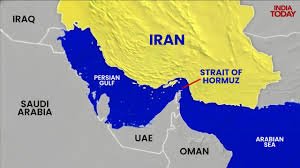Tehran (TDI): In a move laden with far-reaching regional and global implications, Iran’s parliament on Sunday approved a motion to shut the strategic Strait of Hormuz, Al Arabiya reported, amid deepening tensions following the recent United States airstrikes on Iranian nuclear facilities.
The decision, however, is not final and awaits ratification by Iran’s Supreme National Security Council and approval from the office of the Supreme Leader.
The legislation, passed with a majority vote in an emergency session of the Majlis, is being framed by Tehran as a direct response to what it terms an act of “aggression” by the United States, which carried out strikes on June 21 targeting key nuclear installations in Fordow, Natanz, and Isfahan.
While Washington claims the strikes were aimed at halting Iran’s near-weapons-grade uranium enrichment, Tehran has termed the attack a violation of international law and its sovereign rights.
The Strait of Hormuz, a narrow waterway between the Persian Gulf and the Gulf of Oman, handles nearly a third of the world’s seaborne oil trade.
Any disruption in this chokepoint would likely lead to a sharp spike in global energy prices and heighten the risk of a full-scale military confrontation in the region. Iran has long threatened to close the strait in response to Western provocations, but this is the first time the parliament has formally authorized such a move since the 1980s.
Iranian MPs in their statements accused the United States of pushing the region toward the brink of war and said the closure would remain in effect “until foreign military presence in the Persian Gulf ends.” Iranian military commanders have also been placed on high alert as the U.S. Central Command has reinforced its assets in the Arabian Sea and the Strait itself.
The motion comes at a time when Tehran’s regional allies, including Iraq’s Popular Mobilization Forces, Hezbollah in Lebanon, and the Houthis in Yemen, have stepped up their own military readiness. Meanwhile, global reactions remain cautious. China has called for de-escalation, and Russia has warned that any military escalation would be “uncontainable.”
Pakistan, which shares a border with Iran, has so far remained diplomatically engaged, with Prime Minister Shehbaz Sharif recently holding a phone call with Iranian President Masoud Pezeshkian, expressing solidarity and calling for restraint.
While the Iranian military has not yet acted on the parliamentary vote, security officials hinted that the necessary naval preparations are already underway, including the deployment of fast attack crafts and mine-laying capabilities. The final decision is expected to be made in the coming hours, raising fears of a major disruption to global energy supply chains and the onset of a broader regional conflict.
The Diplomatic Insight is a digital and print magazine focusing on diplomacy, defense, and development publishing since 2009.



